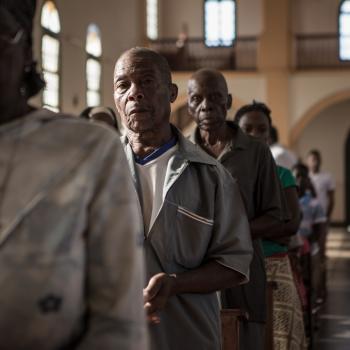 I didn’t think I’d make it through that Tuesday. There I was, sitting in my car as the Fremont Bridge was opening to let a yacht pass through. This was not an occurrence I had planned on, as I’d never known the bridge to open on a winter morning in all the years I’d taught at Seattle Pacific University. And it meant I’d be late to class.
I didn’t think I’d make it through that Tuesday. There I was, sitting in my car as the Fremont Bridge was opening to let a yacht pass through. This was not an occurrence I had planned on, as I’d never known the bridge to open on a winter morning in all the years I’d taught at Seattle Pacific University. And it meant I’d be late to class.
I hate being late, so much that it rarely ever happened. Still, the few times it had, I’d been able to keep my cool. This time, though, was different. I screamed and cursed at the bridge, pummeled my fists on the steering wheel, felt like crying.
I’d become a discombobulated mess.
Perhaps this is understandable. I was teaching twelve credits that quarter and was enrolled in a nighttime master’s program myself, burning the candle at both ends. I’d spent the weekend prepping for my teaching, grading a massive pile of papers, reading, and writing.
Then, on Sunday afternoon, my son called from college to say he’d been injured playing Frisbee:
“No big deal, Mom, just a hernia. It happened a few days ago—sorry I didn’t call sooner—but the doc says the procedure is routine and he scheduled the surgery for tomorrow. Can you drive up? You’re off on Mondays, right?”
Right. I just taught six hours on Tuesday, had a paper due on Wednesday, and was counting on Monday to work.
A son, though, is a son.
I will spare you a detailed description of the series of fiascos that occurred Monday, except to say that my son’s surgery was delayed for many hours (although it went fine), the surgery center had no cafeteria, and I drove home four hours through a blizzard in the middle of night.
When the Fremont Bridge went up on Tuesday morning, I’d been foodless and sleepless for a day. I was dying for a pre-class snack and coffee, which the bridge had snatched from me.
I reached my classroom several minutes late. The students’ eyes were upon me as I pulled my book from my briefcase and stripped off my coat. My stomach was growling wildly and I felt unsteady on my feet, but I’d have to make due: the class was three hours long, our goal to discuss the whole of Night.
Night is the Holocaust memoir of Nobel Peace Prize winner Elie Wiesel, who in the story is the adolescent Eliezer. Beautifully written, painful to read, replete with insight, Night is among my favorite books to teach.
We dove right in, discussing each segment: Eliezer’s childhood in Transylvania, his initial deep belief in God, his family’s deportation to Auschwitz, the brutality the prisoners endured, Eliezer’s waning faith.
We came to a part of the story that is among the most moving to me. Eliezer, underfed and weak, is forced to work at a concentration camp warehouse overseen by a volatile Kapo. One day, for little reason, the Kapo jumps on Eliezer and proceeds to beat him. Eliezer crawls into a corner, bleeding and broken.
Just then, Eliezer feels a cool hand wipe his brow. It belongs to a forced labor deportee—an Aryan girl from France who has never spoken to him. She smiles at Eliezer, looks into his eyes, slips him some bread, and says some soothing words in German, as he doesn’t speak French.
At this point the story flashes forward. Many years later in Paris, Wiesel is reading on the Metro. He looks up and sees a woman with beautiful eyes and suddenly recognizes her—the French girl from the warehouse.
The two go to a café and Wiesel confirms what he’s long suspected: the woman was really Jewish and had worked in the warehouse by forging papers. By speaking German to Eliezer, she’d risked her cover and her life.
I asked my students: “Why would Wiesel choose to break the flow of his story and jump to the Metro scene? We’re far into the book, and he’s never flashed forward before.”
The students regarded me thoughtfully, then one suggested: “The scene was important to Wiesel. His book is about not forgetting the evil that people are capable of. Maybe he wanted to show that a simple kindness is a powerful thing that should also be remembered and oftentimes is.”
Yes. That’s why I love that scene.
We moved through the remainder of the memoir. When class was over at noon, I dashed out the door. My next class would start in ten minutes, the room was far across campus, and I was more desperate than ever for a snack and coffee.
I stopped in the Subway in the quad, but the line was a serpent, so I tried the Starbucks. The queue here, too, was long: a trio of students at the front, a couple of professors, a lone male student, and a quintet of female students right before me.
The barista wasn’t speedy and the orders were complex: a tall, nonfat latte with caramel drizzle; a grande, iced, sugar-free, vanilla latte with soymilk; a triple, venti, no-foam, soy latte.
I looked at my watch as the barista processed the professors’ beverages. Five minutes to go before class. At this rate I wouldn’t make it.
I considered approaching the male student and offering to pay for his order as a way of bypassing the girls, but guilt struck immediately, so I gave up the idea. The boy ordered, received his drink.
I checked my watch. No choice: I’d have to bolt and starve.
Then I heard a voice. “Can I treat you to coffee?” I turned. It was the first of the five girls before me, about to place her order.
“Excuse me?”
She smiled, looked into my eyes. “I’d like to buy you coffee.”
No, I had not experienced a holocaust. No, the girl hadn’t risked her life. But the coffee that she offered helped me make it through the day, and I will remember her kindness for many years to come.
Jan Vallone is the author of Pieces of Someday: One Woman’s Search for Meaning in Lawyering Family, Italy, Church, and a Tiny Jewish High School,which won the Reader Views Reviewers’ Choice Award. Her stories have appeared in many publications. She lives and teaches writing in Seattle.











